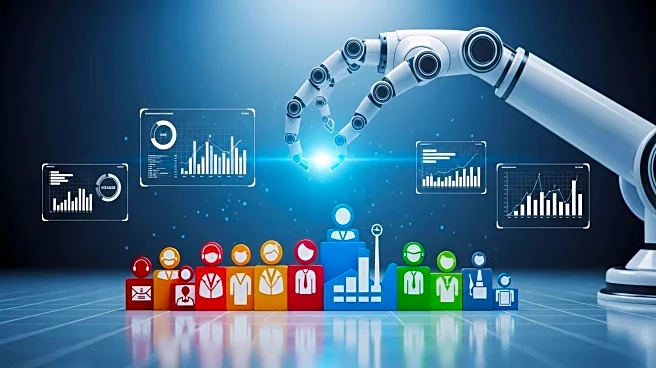What's Happening?
A recent survey conducted by the Federal Reserve Bank of New York reveals that artificial intelligence (AI) is influencing hiring practices among service and manufacturing companies in the New York-Northern New Jersey area. The survey, which included responses from about 300 executives, indicates that 40% of service companies have adopted AI technology this year, up from 25% last year. Similarly, the use of AI among manufacturers has increased from 16% to 26%. Despite the rise in AI adoption, only 14% of service companies have reduced hiring or plan to do so in the next six months, with few layoffs reported. The survey highlights that AI is primarily used for marketing, business analysis, data management, customer service, accounting, and computer programming.
Why It's Important?
The integration of AI into business operations is reshaping the employment landscape, particularly affecting jobs that require a college degree. While AI adoption is leading to a reduction in hiring, it is also creating new job opportunities for individuals skilled in AI technology. This dual impact suggests a shift in the types of skills and roles that are in demand, potentially affecting recent college graduates and entry-level workers. The report underscores the importance of retraining existing employees to adapt to AI-driven changes, with many companies opting to retrain rather than replace workers. This trend could influence educational and training programs, emphasizing the need for skills related to AI and technology.
What's Next?
As AI continues to be integrated into business processes, companies are expected to further invest in retraining programs to equip their workforce with necessary skills. The survey indicates that nearly half of the service and manufacturing firms plan to retrain workers in the next six months. Additionally, the anticipated hiring reductions may prompt educational institutions to adjust curricula to better prepare students for AI-related roles. The ongoing evolution of AI technology may also lead to policy discussions regarding workforce development and employment strategies to mitigate potential job displacement.
Beyond the Headlines
The broader implications of AI adoption extend beyond immediate employment effects. The shift towards AI-driven processes may lead to ethical considerations regarding data privacy and the role of AI in decision-making. Furthermore, the reliance on AI could influence corporate strategies, potentially altering competitive dynamics within industries. As AI technology evolves, businesses may face challenges in balancing efficiency gains with the need to maintain human oversight and ethical standards.










